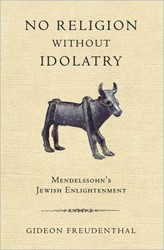 The mid-19th century in Germany is, to my mind, the most unappreciated period in Jewish history. The reason is simple: modern Judaism as we know it was born then and there. Do I exaggerate? I think not. Spinoza’s revolutionary thought in the mid-17th century certainly paved the way for new thinking (see Chapter VIII of my book). Mendelssohn’s attempts in the late 18th century to reconcile faith and reason lay the groundwork within the Jewish community. The early reforms of Israel Jacobson, along with the responses of the Parisian Sanhedrin to Napoleon in the first decade of the 19th century mark the irreversible first steps of putting theory into practice.
The mid-19th century in Germany is, to my mind, the most unappreciated period in Jewish history. The reason is simple: modern Judaism as we know it was born then and there. Do I exaggerate? I think not. Spinoza’s revolutionary thought in the mid-17th century certainly paved the way for new thinking (see Chapter VIII of my book). Mendelssohn’s attempts in the late 18th century to reconcile faith and reason lay the groundwork within the Jewish community. The early reforms of Israel Jacobson, along with the responses of the Parisian Sanhedrin to Napoleon in the first decade of the 19th century mark the irreversible first steps of putting theory into practice.
But modernity hits its stride in Judaism in the second decade of the 19th century. In 1817 the Hamburg Temple embraces reform of Judaism as its raison-de-entre. In 1819 Leopold Zunz establishes the pioneering Society for the Culture and Science of Judaism, which advocates for the academic study of our sacred texts and religious heritage. The same year a leading traditionalist rabbi, Moses Sofer, castigates this approach in his broadside Eleh Divrei Habrit. The grounds for the great debate have been set.
The debate truly unfolds over a ten year period (1836−1846) between three giants of modern Judaism who were contemporaries, and actually knew and liked each other (until their disagreements drove them apart). Rabbi Abraham Geiger began arguing that Judaism has always evolved and should continue to change with the times. He called for radical shifts to meet the demands of modernity, including the critical study of Torah, the elimination of outdated prayers and customs, and the equal treatment of men and women. Rabbi Samson Raphael Hirsch, while acknowledging the need to engage in secular learning in the new age, contended that Judaism’s truths and law was eternal and not subject to evolution. Rabbi Zecharias Frankel, an advocate of “moderate reform” famously stormed out of an 1845 conference in Frankfort over the elimination of Hebrew from some of the liturgy.
Rabbis Geiger, Hirsch, and Frankel became known, respectfully, as the “fathers” of Reform, Orthodox, and Conservative Judaism. The spectrum of modern denominational Judaism was born in that time and place. Chapter IX of my book chronicles this remarkable debate. While the central locale of the debate would soon shift to America it was these three German Jewish leaders, through their sermons, books, and organizational activities who set the stage. Though hardly household names in the Jewish community today we owe a debt of gratitude to their great debate. I once taught a course about them called “The Three Tenors of Modern Judaism.” Their magnificent voices created the opera we sing today.
Rabbi Barry Schwartz is director of The Jewish Publication Society in Philadelphia and rabbi of Congregation Adas Emuno in Leonia, NJ. He is the author of Judaism’s Great Debates (Behrman House, March 2012 student edition; Jewish Publication Society, May, 2012 adult edition).
Rabbi Barry Schwartz is director of The Jewish Publication Society in Philadelphia and rabbi of Congregation Adas Emuno in Leonia, NJ. He is the author of Judaism’s Great Debates (Behrman House, March 2012 student edition; Jewish Publication Society, May, 2012 adult edition).
We Need More Jewish Debate, Not Less


